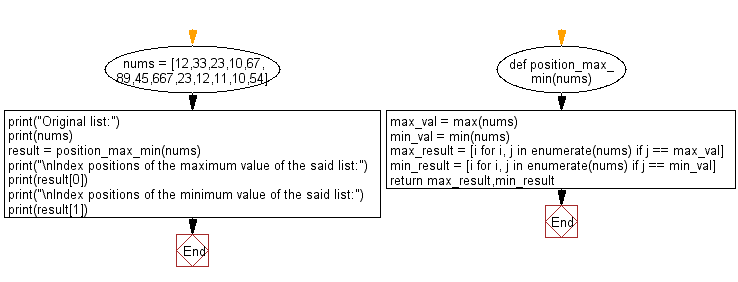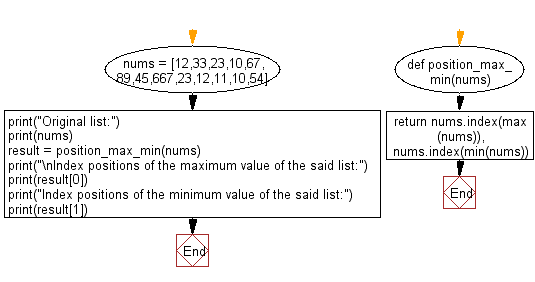Python: Find all index positions of the maximum and minimum values in a given list
Python List: Exercise - 132 with Solution
Write a Python program to find all index positions of the maximum and minimum values in a given list of numbers.
Sample Solution-1:
Python Code:
def position_max_min(nums):
max_val = max(nums)
min_val = min(nums)
max_result = [i for i, j in enumerate(nums) if j == max_val]
min_result = [i for i, j in enumerate(nums) if j == min_val]
return max_result,min_result
nums = [12,33,23,10,67,89,45,667,23,12,11,10,54]
print("Original list:")
print(nums)
result = position_max_min(nums)
print("\nIndex positions of the maximum value of the said list:")
print(result[0])
print("\nIndex positions of the minimum value of the said list:")
print(result[1])
Sample Output:
Original list: [12, 33, 23, 10, 67, 89, 45, 667, 23, 12, 11, 10, 54] Index positions of the maximum value of the said list: [7] Index positions of the minimum value of the said list: [3, 11]
Flowchart:

Visualize Python code execution:
The following tool visualize what the computer is doing step-by-step as it executes the said program:
Sample Solution-2:
- Use max() and list.index() to get the maximum value in the list and return its index.
- Use min() and list.index() to get the minimum value in the list and return its index.
Python Code:
def position_max_min(nums):
return nums.index(max(nums)), nums.index(min(nums))
nums = [12,33,23,10,67,89,45,667,23,12,11,10,54]
print("Original list:")
print(nums)
result = position_max_min(nums)
print("\nIndex positions of the maximum value of the said list:")
print(result[0])
print("Index positions of the minimum value of the said list:")
print(result[1])
Sample Output:
Original list: [12, 33, 23, 10, 67, 89, 45, 667, 23, 12, 11, 10, 54] Index positions of the maximum value of the said list: 7 Index positions of the minimum value of the said list: 3
Flowchart:

Visualize Python code execution:
The following tool visualize what the computer is doing step-by-step as it executes the said program:
Python Code Editor:
Have another way to solve this solution? Contribute your code (and comments) through Disqus.
Previous: Write a Python program to count the same pair in three given lists.
Next: Write a Python program to check common elements between two given list are in same order or not.
What is the difficulty level of this exercise?
Test your Programming skills with w3resource's quiz.
Python: Tips of the Day
Find current directory and file's directory:
To get the full path to the directory a Python file is contained in, write this in that file:
import os dir_path = os.path.dirname(os.path.realpath(__file__))
(Note that the incantation above won't work if you've already used os.chdir() to change your current working directory, since the value of the __file__ constant is relative to the current working directory and is not changed by an os.chdir() call.)
To get the current working directory use
import os cwd = os.getcwd()
Documentation references for the modules, constants and functions used above:
- The os and os.path modules.
- The __file__ constant
- os.path.realpath(path) (returns "the canonical path of the specified filename, eliminating any symbolic links encountered in the path")
- os.path.dirname(path) (returns "the directory name of pathname path")
- os.getcwd() (returns "a string representing the current working directory")
- os.chdir(path) ("change the current working directory to path")
Ref: https://bit.ly/3fy0R6m
- New Content published on w3resource:
- HTML-CSS Practical: Exercises, Practice, Solution
- Java Regular Expression: Exercises, Practice, Solution
- Scala Programming Exercises, Practice, Solution
- Python Itertools exercises
- Python Numpy exercises
- Python GeoPy Package exercises
- Python Pandas exercises
- Python nltk exercises
- Python BeautifulSoup exercises
- Form Template
- Composer - PHP Package Manager
- PHPUnit - PHP Testing
- Laravel - PHP Framework
- Angular - JavaScript Framework
- Vue - JavaScript Framework
- Jest - JavaScript Testing Framework
